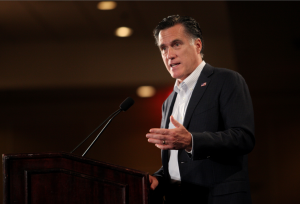 Electoral history was made on Jan. 10, when Republican presidential hopeful Mitt Romney won the N.H. primary, following a victory in the Iowa caucus on Jan. 3. This makes Romney the first Republican non-incumbent to win both New Hampshire and Iowa since 1976.
Electoral history was made on Jan. 10, when Republican presidential hopeful Mitt Romney won the N.H. primary, following a victory in the Iowa caucus on Jan. 3. This makes Romney the first Republican non-incumbent to win both New Hampshire and Iowa since 1976.
“Tonight, we celebrate,” said the former Massachusetts governor. “Tomorrow, we go back to work.”
Romney received 39.3 percent of the vote, with a double-digit victory over second-place finisher Texas Rep. Ron Paul, who garnered 22.9 percent of the vote. Utah governor Jon Huntsman—whose polling numbers have languished in the low single digits for several months—took third place, with 16.9 percent of the vote. Some deem this result disappointing, however, since Huntsman skipped campaigning in Iowa to focus exclusively on N.H.
Former House Speaker Newt Gingrich and former Pennsylvania senator Rick Santorum finished fourth and fifth respectively, each with 9.4 percent, despite Santorum’s impressive second-place finish in Iowa last week.
Texas governor Rick Perry placed sixth, with a mere 0.7 percent of the vote. However, according to the Associated Press, he is looking forward to a campaign revival in the Jan. 21 primary in South Carolina, a conservative Southern state.
Exit polls of 2,760 New Hampshire GOP primary voters on the Washington Post website revealed that 49 percent of those who identified themselves as Republican voted for Romney, and 41 percent of those who identified as Democrats voted for Huntsman. In addition, 43 and 46 percent of those who respectively were “dissatisfied” or “angry” with the Obama administration voted for Romney. Forty percent of those “satisfied” voted for Huntsman.
Interestingly, 35 percent of voters said the ability to defeat Barack Obama was the most important quality in their primary decision; 62 percent of those who reported such voted for Romney. Thirteen percent cited being a true conservative as the most important quality in a candidate, and 42 percent of those voters voted for Paul.
Staples students also offer their take on the primary. Doug Russ ’13, for instance, finds that Romney’s Iowa-N.H. joint victory makes it incredibly difficult for any of his contenders to outshine him.
“While Romney’s win in N.H. could have been more dramatic, he has the most cash and resources that, at this point, makes it seem like the nomination is already his,” said Russ, who is the Northeast State Expansion Agent for the Junior State of America (JSA).
Kelly Cirillo ’13, the Northeast State Director of Logistics for JSA, was not surprised by Romney’s victory. However, as a self-proclaimed Huntsman fan, Cirillo was ultimately disappointed with the results of the primary.
“I think a lot of the focus has been taken from the underdogs, and more and more attention is put on Romney,” Cirillo said. “Part of Romney’s success, I feel, is out of the fact that Republicans see him as the frontrunner, and he will thus be more likely to defeat Obama in a general election.”
Cirillo added that she suspects that many Republicans are voting primarily to regain party control in the Oval Office, rather than for the candidate whose views and opinions they truly support and value the most.
The next key election event will be the S.C. GOP primary on Jan. 21. Check back to InklingsNews.com on Jan. 22 for coverage of the event.













































